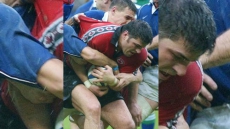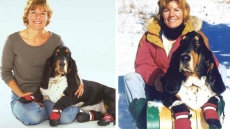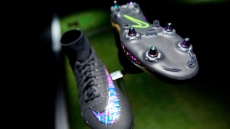LOS ANGELES — Taking a page from Donald Trump's playbook, Intel CEO Brian Krzanich is trying to do for the chipmaker what Trump did for his political career: give it a boost by being on national TV.
Krzanich is the central and most credible tech expert of the five judges who will pick a $1 million winner among technology startups on a new Intel-funded competition TV show, "America's Greatest Makers ." The 10-episode series kicks off on TBS on Tuesday.
"I want people to see that technology's fun and it's not something to be afraid of," Krzanich said on the show's Los Angeles set. "These aren't super physicists and engineers. They're average people going out and building something."
The show has a catch, of course.
Each team has to use Intel's latest sensor-laden chip package, Curie, to make a Web-connected gizmo that wows the judges, a group that includes NBA star Shaquille O'Neal and Mike Rowe of the Discovery show "Dirty Jobs."
Contestants try to make everything from smart fishing bobbers to football helmets that sense if a player suffers a concussion-inducing hit.
The chipmaker is bankrolling the show as part of its push into growing businesses — Internet-based computing, high-speed memory chips and smart, connected objects that make up what's known as the "Internet of Things," or IoT. These growth areas made up about 40 per cent of Intel's $55 billion in revenue last year, and nearly two-thirds of its operating profits.
Intel grew hand in hand with personal computers, many of which bear an "Intel Inside" sticker. But PCs are expected to drive less demand for chips in the future. Fifteen years ago, PCs made up half the market, but that will drop to 17 per cent by 2020, according to research firm IDC. Intel's barely present in mobile devices, which will account for about a quarter of chip sales. Intel's bet is on IoT devices, which will go from next to nothing to nearly 6 per cent of the chip market in 2020, according to IDC.
"Intel completely missed the handset market," IDC semiconductor analyst Mario Morales says. "They're doing whatever they can not to miss another market like that."
The show has plenty of Hollywood sizzle because it was created by Mark Burnett, the reality-TV king behind "Survivor," ''The Apprentice," and "Shark Tank." Even though it has more than 100 staffers, Krzanich says it represents a "minuscule" part of Intel's marketing budget, though he wouldn't get more specific.
Intel's effort also highlights a larger trend toward "advertainment" and the "celebritization of all kinds of industry," says June Deery, a communications professor at Rensselaer Polytechnic Institute and author of "Reality TV."
Whether they're chefs, hoteliers or tech executives, business leaders are under pressure to put their personalities on display. Opening up can make consumers feel like they're part of the process and get them rooting for a company's success.
"People feel the pressure to self-brand," she says. "It's part of their jobs now."
The show is a big coming out for a man whose public appearances since becoming CEO in 2013 have largely been limited to investor conferences, press briefings and the annual CES gadget show in Las Vegas.
Krzanich, the 55-year-old son of an aerospace engineer, says he grew up tinkering, making Heathkit radios and fixing his TV set with his father, just a stone's throw from Intel's headquarters in Santa Clara, California.
As though to burnish his own "maker" credentials, Krzanich says he and his wife are converting a 1920s-era gas pump into a street light for the front of their house. His eldest daughter used an early Curie prototype to notify her when her younger sister enters her bedroom uninvited. And Krzanich spent a few weekends with his wife a few years ago building a 40-foot-high windmill to pump air into his friend's Colorado pond to keep trout from dying in the winter.
"I bought a welder and I watched YouTube and figured it out," he says. "Making is about getting skills that you don't have, no matter what it is."
Krzanich believes the market for connected devices will grow immensely, from the roughly 6 billion smartphones today to some 50 billion smart devices by the end of the decade. The show, he hopes, will electrify the entrepreneurial spirit of technology buffs.
"I want to actually see that people are buying the product and doing something with it," he says. "If that happens, then the company will be fine, and it's money well spent."






